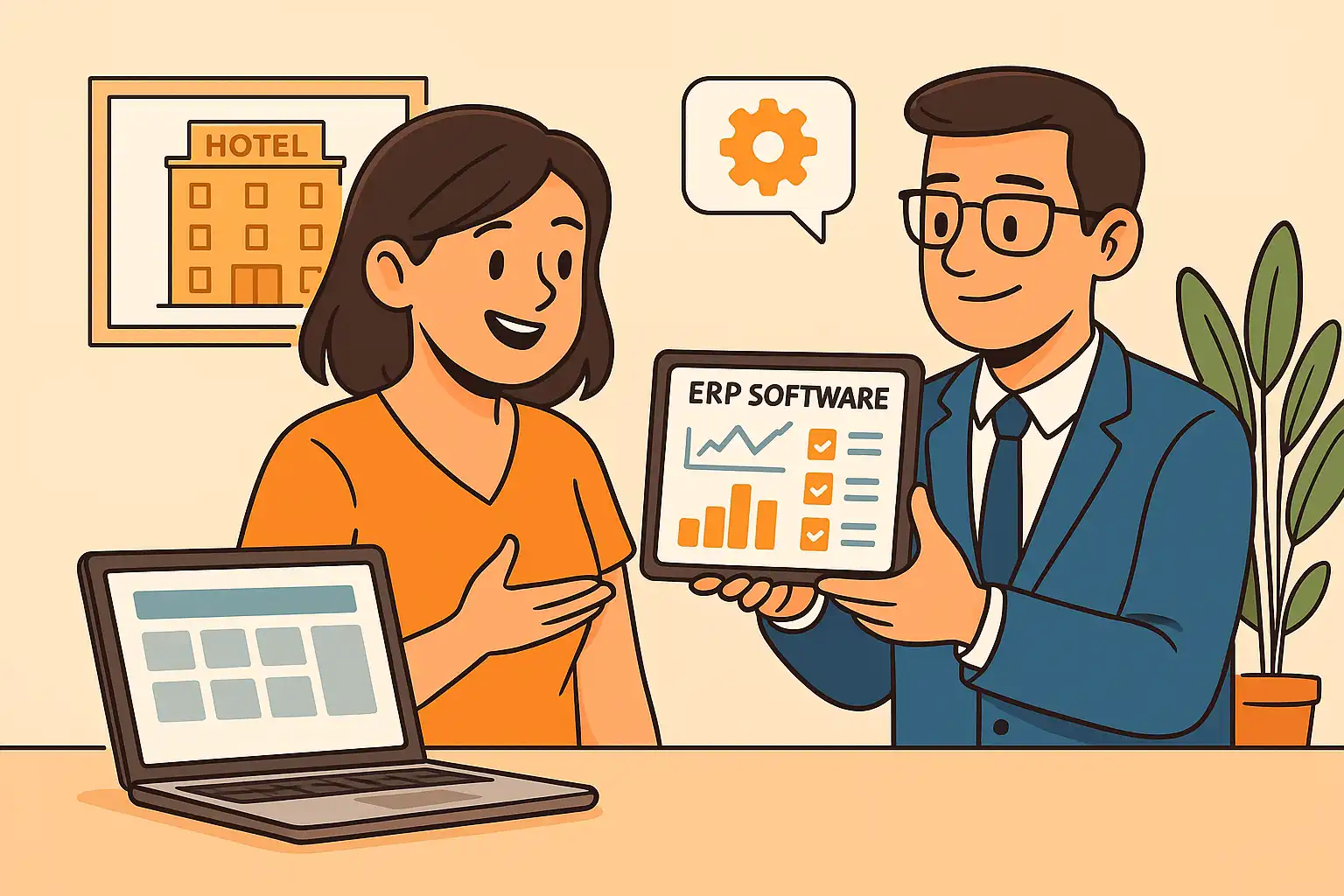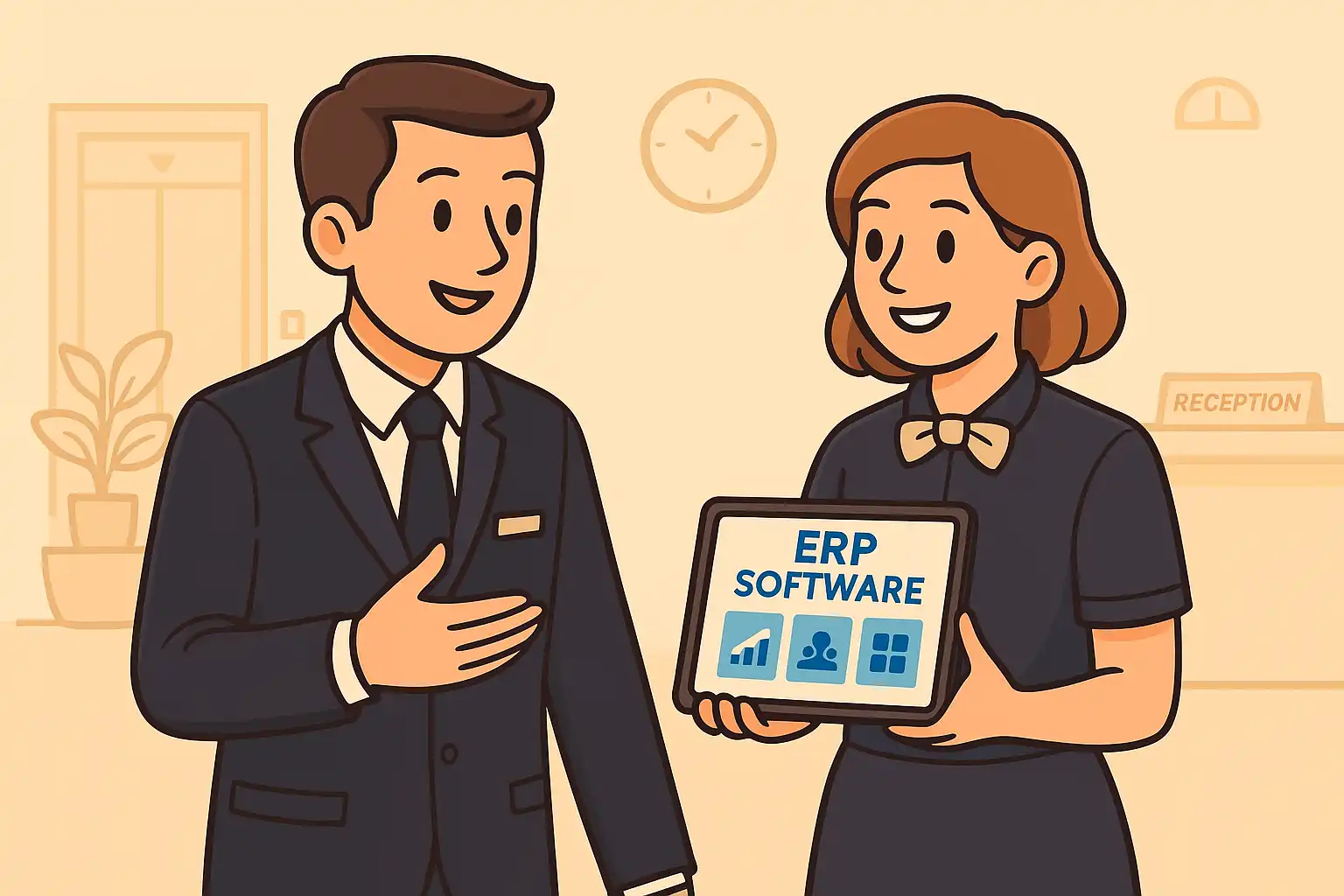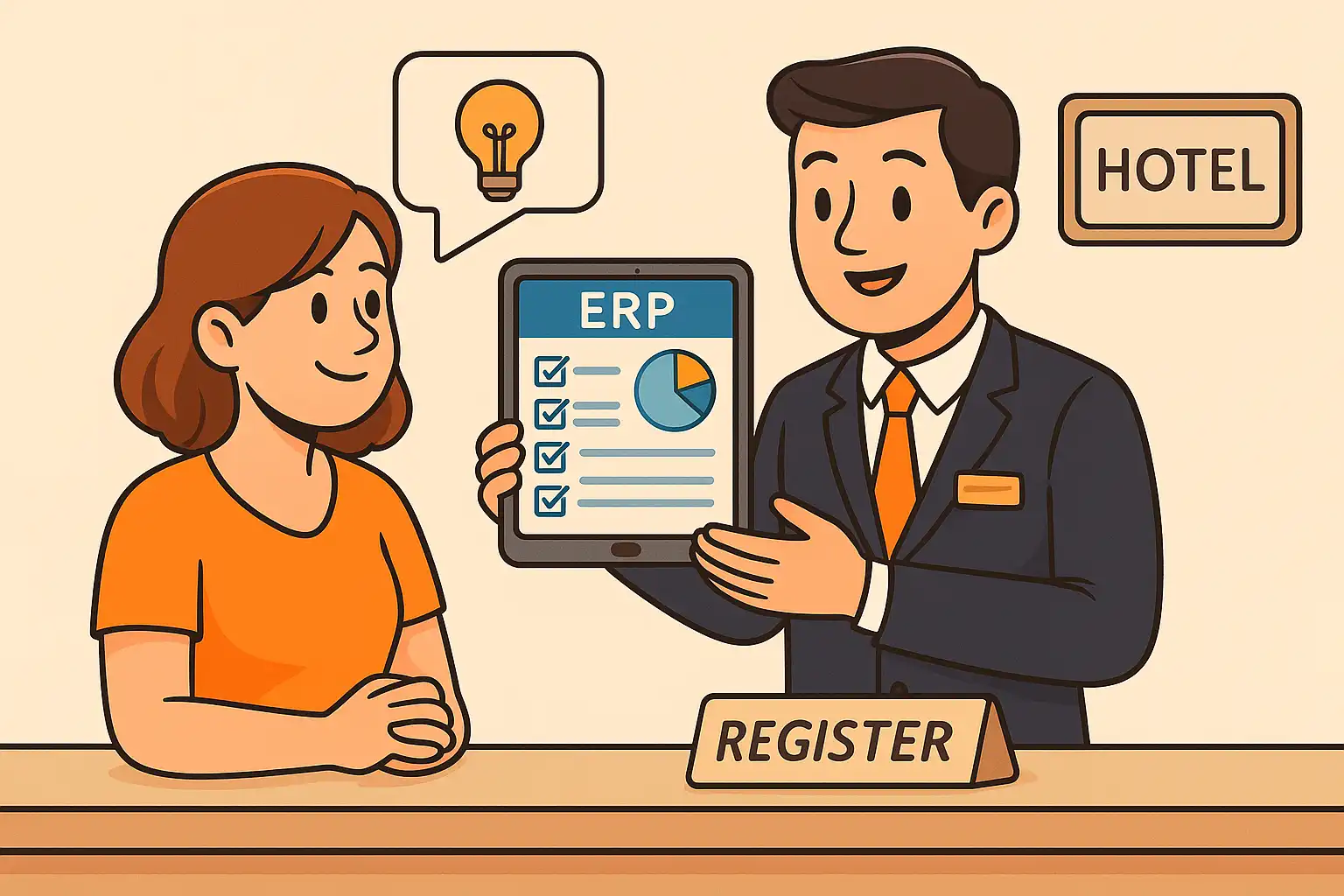ERP for Hospitality: Guide to Hotel Management Systems
 Mika Takahashi
Mika Takahashi Mika Takahashi
Mika TakahashiRunning a successful hotel can feel like juggling 8-12 different software systems at once—creating a whirlwind of operational chaos that affects not just your team but your guests’ experience and your bottom line. The hospitality industry faces unique challenges that general business software just can’t handle—from managing perishable inventory like rooms to coordinating seamless guest experiences across multiple departments.
That’s where enterprise resource planning (ERP) systems built specifically for hospitality come in. Unlike generic software, hospitality ERP brings all your hotel operations together—reservations, housekeeping, financial management, guest services, and inventory control—into one easy-to-use platform that offers real-time insights and boosts operational efficiency.
In this guide, we’ll dive into how ERP for hospitality systems can transform your hotel operations, highlight the must-have features that make a difference, and explain why Prostay is the go-to ERP solution for hospitality businesses. Whether you’re managing a single property or juggling multiple locations, understanding what ERP can do for you is key to staying competitive in today’s fast-paced hospitality market.

ERP for the hospitality sector marks a big shift from managing fragmented systems to using a unified digital platform. Traditionally, hotels juggle separate tools for property management, point of sale (POS), accounting, housekeeping, maintenance, and guest communications—leading to data silos, inefficiencies, and frustrated guests.
Hospitality ERP stands apart from generic business software because it’s built to tackle industry-specific challenges. Hotels manage both physical inventory (linens, amenities, food) and intangible inventory (room nights, service capacity) while striving to deliver outstanding guest experiences. Plus, the hospitality industry operates on dynamic pricing, seasonal demand swings, and complex revenue streams—things standard software just can’t handle well.
Today’s hospitality ERP systems have evolved beyond the old patchwork approach. Instead of forcing staff to log into multiple systems and manually transfer data, modern platforms offer single sign-on access to all your key business functions. This means no more wasted hours on tedious data entry or costly errors.
The magic lies in real-time data syncing across departments. When a guest checks out, housekeeping task lists update instantly, room availability adjusts across all booking channels, maintenance requests are triggered if needed, and billing processes automatically—no manual effort required. This seamless coordination keeps front desk, back office, and guest services perfectly in sync.
By centralizing everything, hospitality ERP creates one source of truth for your hotel operations. Financial data, guest preferences, operational metrics, and inventory levels are all accessible to authorized team members, empowering smarter decisions that boost both operational efficiency and guest satisfaction.
Modern ERP for hospitality systems revolutionize how hotels handle their core operations, delivering clear improvements in efficiency and guest experience. Take reservation management: real-time room availability updates help you avoid costly overbookings that frustrate guests and hurt your reputation.
With ERP integration, your room inventory updates instantly across every booking channel—whether it’s online travel agencies, your own website, or phone reservations. This prevents double bookings and the expensive hassle of relocating guests to competitors.
Housekeeping workflows get a major upgrade too. Instead of relying on manual handoffs between front desk and housekeeping, ERP for hospitality systems automatically generate task lists when guests check out, include special requests from guest profiles, and update room status in real-time as tasks are completed.
Integrating point of sale (POS) systems for your restaurants, spas, gift shops, and other outlets means guest billing is unified and hassle-free. Instead of juggling separate charges across different systems, ERP consolidates all guest spending into one invoice and provides detailed revenue reports by department.
Centralized inventory management tackles one of hospitality’s toughest challenges—coordinating everything from rooms division to food and beverage supplies. Hospitality ERP tracks linens, amenities, maintenance supplies, and more, optimizing procurement cycles and reducing waste with smart predictive analytics.
Mobile access lets hotel managers keep a finger on the pulse from anywhere. Whether you’re checking occupancy reports from home, approving purchases on the go, or handling issues during off-site meetings, mobile ERP access keeps you connected without needing to be on-site.
Financial operations benefit too. Automated revenue recognition, multi-currency processing, and real-time financial reporting replace manual accounting tasks that used to take days or weeks. This speed lets you make agile pricing decisions and respond quickly to market changes.
Great hospitality ERP systems come packed with specialized features tailored to the unique needs of hotels, resorts, and restaurants. These go far beyond basic business software to handle complex revenue streams, compliance requirements, and high guest expectations.
Real-time room inventory tracking is the cornerstone of effective property management. Advanced ERP platforms adjust room rates dynamically based on occupancy, local demand, competitor pricing, and booking trends. This helps maximize revenue per available room while keeping your hotel competitively priced.
Housekeeping management goes well beyond assigning tasks. Modern hospitality ERP automatically routes maintenance requests, tracks task completion times, and integrates guest preferences so rooms are prepared just the way your guests like them. Loyal guests get their extra pillows or preferred room temperature without front desk staff lifting a finger.
Tracking guest preferences and optimizing room assignments directly improve guest satisfaction and encourage repeat visits. The system learns from past stays, special requests, and feedback to suggest the best room match—whether it’s a quiet spot for business travelers or connecting rooms for families.
Dynamic pricing engines crunch data from local events, weather, competitor rates, and historical patterns to recommend optimal room prices in real time. Rates can update multiple times daily to maximize revenue while maintaining strong occupancy.
Multi-currency accounting supports international operations by handling foreign exchange transactions automatically and generating reports in multiple currencies—ideal for hotels serving diverse guests or managing multiple properties.
Revenue recognition compliance ensures deposits, group bookings, and loyalty redemptions are accounted for correctly, reducing audit risks and keeping financial reporting accurate and transparent.
Cost center reporting breaks down profit and loss by department—rooms, food and beverage, spa, events—giving hotel managers clear insight into what’s driving profitability and where improvements are needed.
Automated monthly closes speed up financial reporting by eliminating manual journal entries and depreciation calculations, freeing your finance team to focus on strategic initiatives.
Unified guest profiles bring together every interaction—from booking to feedback—into one place. These profiles track spending, preferences, special occasions, and past issues, enabling your team to deliver personalized service that truly wows guests.
Customer relationship management (CRM) integration powers targeted marketing campaigns based on guest segmentation, booking history, and spending habits. You can send personalized offers, promote relevant services, and manage loyalty programs that keep guests coming back.
Service request tracking connects guest apps directly with housekeeping, maintenance, and concierge teams. When guests request extra towels, report issues, or ask for recommendations, staff get instant notifications with full guest context.
Personalized upselling suggestions use guest history to recommend upgrades, dining experiences, spa treatments, or activities that match their interests—boosting revenue while enhancing satisfaction.

The benefits of hospitality ERP go beyond just software—they deliver real, measurable improvements that justify the investment and set hotels up for long-term success. Data shows hotels using integrated ERP for hospitality systems enjoy better operational efficiency, stronger financial performance, and happier guests compared to those stuck with fragmented tools.
Operational costs typically drop 15-25% thanks to automated workflows that cut duplicate data entry, reduce manual communication, and optimize inventory management. Staff spend less time wrestling with software and more time focusing on guest services and revenue growth.
Revenue per available room often climbs 8-12% due to smarter pricing, fewer overbookings, and enhanced upselling powered by ERP. Dynamic pricing engines help you capture top rates during busy times while staying competitive during slow periods.
Guest satisfaction scores usually rise 20-30% after ERP implementation as service becomes more consistent, personalized, and responsive. Unified guest data lets your team anticipate needs and resolve issues faster.
Compliance with hospitality regulations is streamlined with automated reporting, reducing audit risks and saving time on PCI-DSS, GDPR, and local licensing requirements.
Operational scalability improves dramatically, too. Adding new properties or expanding services is easier with standardized processes, centralized reporting, and unified management—without a proportional increase in overhead.
Most hotels see ROI within 12-18 months from lower labor costs, better revenue management, and smoother operations—a win-win for your business and your guests.
Prostay stands out as the premier cloud-based hotel ERP solution built exclusively for hotels, resorts, and hospitality brands aiming to boost operational efficiency and guest experience. Unlike generic software adapted for hospitality, Prostay was designed from the ground up to tackle the unique challenges of hotel operations.
It offers pre-built integrations with major property management systems like Prostay, Opera, Protel, and RMS, cutting out the need for costly custom development. These seamless connections preserve your existing workflows while enhancing them with powerful analytics, automation, and unified reporting.
Prostay’s unlimited user licensing breaks away from traditional per-seat pricing, removing barriers so your entire team, from front desk to housekeeping, can access real-time operational data and mobile task management.
The mobile-first design means your staff and management can use full system features from tablets and smartphones, enabling instant updates, smooth communication, and on-the-go access to guest information anywhere on the property.
Unique hospitality features set Prostay apart: advanced deposit management for complex group bookings, event space optimization, and dynamic rate management that reacts to market changes in real time.
Case studies show Prostay clients typically see a 25% cut in administrative overhead and an 18-month payback period thanks to streamlined workflows and enhanced revenue optimization.
Its comprehensive analytics dashboard delivers real-time insights on occupancy, revenue per available room, guest satisfaction, and operational metrics—helping managers make smarter, data-driven decisions that improve both financial performance and guest experience.
Built on cloud architecture, Prostay offers reliable access, automatic updates, and enterprise-grade security without heavy IT infrastructure costs. It scales effortlessly to support growth and seasonal demand swings.

Successfully rolling out ERP in hospitality requires careful planning, involving all stakeholders, and a phased approach to minimize disruption and maximize adoption. Given the complexity of hotel operations, change management, data migration, and staff training are critical to success.
Start with a thorough system assessment to identify pain points, integration needs, and operational goals. This includes analyzing your current software stack, documenting workflows, and pinpointing key data to migrate.
Engage teams from operations, finance, housekeeping, and IT early on to ensure all needs are addressed and timelines align with daily realities. Front-line staff insights are invaluable since they know the day-to-day challenges best.
Roll out core financial modules first, then add operational features like housekeeping management, POS integration, and analytics. This staged approach lets staff get comfortable before introducing more complex workflows.
Data migration must be carefully planned to transfer guest histories, financials, and operational data accurately, avoiding service interruptions.
Train staff with role-specific modules covering front desk, housekeeping, management reporting, and back-office functions. Ongoing training helps your team adapt and leverage new features over time.
Plan for a realistic 3-6 month timeline to fully deploy the system, allowing for thorough testing and preparation. Rushing can cause operational hiccups and frustrate staff.
Post-launch, ongoing support and optimization are key to maximizing your ERP investment. Regular reviews, refresher training, and feature updates help your hotel evolve with changing business needs.
Monitoring key performance indicators like adoption rates, operational efficiency, and financial results validates success and highlights opportunities for further improvement.
Implementing ERP transforms hospitality operations far beyond just software deployment. It gives hotels unified control, better guest experience tools, and data-driven insights that create lasting competitive advantages in today’s demanding market.
With Prostay’s specialized features, seamless integrations, and deep hospitality expertise, your hotel is well-positioned to thrive—delivering operational excellence and exceptional guest experiences that drive long-term success.